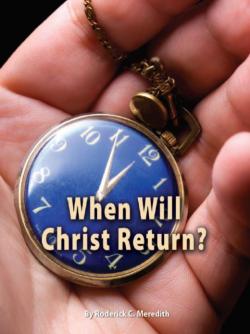Easter or Passover: Which Is for Christians?
On April 24 this year, billions of people will celebrate Easter. About a week earlier, after sunset on Sunday, April 17, many Christians will gather to observe the biblical Passover. Does it matter which festivals you observe? The answer may surprise you!
This spring, billions of people will memorialize Jesus Christ's resurrection by observing the ancient rite of Easter. Although the festival's name and seasonal observance pre-date Christianity, and the Easter Sunday observance does not even correspond to the actual day of Christ's resurrection, most professing Christians assume that the non-Christian festival has now been "Christianized" into something of which Jesus Christ would approve.
But is their assumption correct? Christians who study the Bible carefully, who look closely at the historical record, will come to a different conclusion. Rather than commemorate Christ's resurrection on an incorrect date, they will commemorate His sacrifice by observing the Christian Passover, in the way the early Church did—in the way He instructed—as we find in Scripture. Does this shock you? Read on!
"Christianizing" the Festivals of Ancient Sex Goddesses?
The origins of pre-Christian Easter festivals in pagan cultures are well known in history. In the ancient world, some of the greatest female deities were the various incarnations of the great fertility goddesses known as Ishtar (Babylonian), Astarte (Phoenician), Atargatis (Philistine), Ashtoreth (Hebrew), Eastre (Anglo-Saxon), Ostara (German) and Aphrodite (Greek).
These goddesses are regarded as essentially the same deity, due to the similarities of their mythologies, worship, names and festivals. These factors are what define a deity as its worship moves between cultures. The primary fertility festivals for these deities (and their associated male consorts) were in the spring—a time of renewal and birth.
In The Myth of the Goddess, Anne Baring and Jules Cashford write, "Now we read everywhere of goddesses and gods who take their being from one Primordial Goddess who is the origin of all things.... The goddess has many names and many different tales are told about her, but one story is unvarying throughout the Near East. The goddess becomes separated from the one she loves, who dies or seems to die, and falls into a darkness called 'the Underworld.' This separation is reflected in nature as a loss of light and fertility. The goddess descends to overcome the darkness so that her loved one may return to the light, and life may continue.
"Aphrodite is primarily a descendant of the Mesopotamian Goddess Inanna-Ishtar, who became Astarte in Phoenicia and was called Atargatis by the Philistines, and Ashtoreth by the Hebrews. Inanna's consort, Dumuzi, and Ishtar's Tammuz became, in the Greek tradition, Aphrodite's Adonis, the dying and resurrected son-lover of the goddess in a new form.
"The Greek goddess Aphrodite loses her lover, the beautiful Adonis.... Now the goddess no longer rescues him herself, but has to ask the god Zeus to allow him to return to life from spring to autumn, the fertile season of the earth. Finally, Jesus, son of the Virgin Mother, Mary, dies.... Christ is 'rescued' by his Father in Heaven, but, like the others, his return coincides with the date of the earth's regeneration. Easter is celebrated on the Sunday following the first full moon after the spring equinox, so that Christ's resurrection, like those before him, also reflects the turning of winter into spring" (pp. 145–147).
Another well-known cultural anthropologist, Joseph Campbell, drew the conclusion that the "Christian" practice of Easter "occurs on the date of the annual resurrection of Adonis, which in the Christian cult became Easter. In both the pagan cult and the Christian, the resurrection is of a god" (Occidental Mythology, p. 138).
These authors are expressing a view commonly held among cultural anthropologists that there was a significant continuity in "Christianized" Gentile cultures with their pagan past. They had a tendency, over time, to superimpose Christian themes as a veneer over their existing pagan practices, which were already deeply ingrained in their societies and psyches. They are saying that in history, the incorporation of Easter as memorial to Christ's resurrection is an adaptation of an earlier pagan resurrection festival. The practice did not originate in Christianity.
While it is true that most professing Christians observe Easter, reasoning that it commemorates Christ's resurrection, the Bible actually commands Christians to observe a memorial to His sacrificial death! When Christ instructed His followers to keep the Passover with a fulfilled, Christian meaning, it became a memorial to His sacrifice as the Lamb of God—not to His resurrection. Christ avoided confusing the meaning of His unique sacrifice with the well-known pagan "resurrection" rites of His time and before.
In fact, God's Holy Days do include a date to commemorate the resurrection of faithful Christians at the return of Jesus Christ (1 Corinthians 15:12–20, 50–52). That Holy Day is known as the Feast of Trumpets, which occurs in the autumn (Leviticus 23:24), not in the spring. As we shall see shortly, the practice and the meaning of the Christian Passover are explicitly taught in the Bible and were taught by the first-century Church.
Yet, as Christianity spread into Gentile areas, with passing generations, some churches tended to gravitate back toward prior pagan cultural practices of their own societies, and away from religious practices that held associations with Judaism.
As a result, the proper observance of Pasch, or Passover, was changed both in its time and meaning. Historians in main stream Christianity acknowledge the transformation. The New Catholic Encyclopedia explains, "Not only was the significance of the Jewish feast changed by the Christians, but also the date. The Jewish method of fixing the date, the 14th of Nisan, did not confine it to any one [Roman calendar] day; at a very early time [Roman] Christians assigned their Pasch to the Sunday following the Jewish feast" (1967, vol. 5, p. 7). Pasch is Latin for Passover. But upon the change of date and meaning, this celebration is more appropriately identified by the English word Easter.
"The Asiatic practice in the 2d century of observing Easter [Pasch] on the day of the Jewish Passover conflicted with the Roman custom of celebrating Easter on Sunday, the day of the Resurrection.... Originally both observances were allowed, but gradually it was felt incongruous that Christians should celebrate Easter on a Jewish feast, and unity in celebrating the principal Christian feast was called for" (p. 8).
"Quartodecimanism [meaning the practice of observing Passover on Nisan 14 of the Hebrew calendar], prevalent in Asia Minor and Syria in the 2d century, emphasized the death of Christ, the true Paschal victim (John 18:28; 19:42), while Roman practice emphasized the observance of Sunday as the day of the Resurrection.... As Christianity separated from Judaism, Gentile Christians objected to observing the principal Christian feast on the same day as the Jewish Passover" (vol. 12, p. 13).
Christianized Veneer or Solid Scriptural Practice?
It is clear that Easter is a "Christianized" pagan festival. And in Scripture, God strongly condemns attempts to worship Him with practices taken from the worship of false gods. Notice how He instructed Israel:
"When the Lord your God cuts off from before you the nations which you go to dispossess, and you displace them and dwell in their land, take heed to yourself that you are not ensnared to follow them, after they are destroyed from before you, and that you do not inquire after their gods, saying, 'How did these nations serve their gods? I also will do likewise.' You shall not worship the Lord your God in that way; for every abomination to the Lord which He hates they have done to their gods; for they burn even their sons and daughters in the fire to their gods. Whatever I command you, be careful to observe it; you shall not add to it nor take away from it" (Deuteronomy 12:29–32).
God clearly tells us to avoid recycling pagan religious customs for His worship. We are to worship God as He instructs, not as we might reason on our own. Keeping Easter certainly adds to what God instructed, and rejecting the Christian Passover certainly takes away from what we are told to do as Christians.
Christ said, "'This people honors Me with their lips, but their heart is far from Me. And in vain they worship Me, teaching as doctrines the commandments of men.' For laying aside the commandment of God, you hold the tradition of men" (Mark 7:6–8).
The Gospels Show What to Do
Some people may be surprised to learn that the New Testament gospels have a lot to say about the actual practice that Jesus and His disciples followed the night before Jesus' death: "And He sent Peter and John, saying, 'Go and prepare the Passover for us, that we may eat'... And He took bread, gave thanks and broke it, and gave it to them, saying, 'This is My body which is given for you; do this in remembrance of Me.' Likewise He also took the cup after supper, saying, 'This cup is the new covenant in My blood, which is shed for you'" (Luke 22:8, 13–20). He also washed the disciples' feet and instructed them to do the same for each other (John 13:1–15).
Christ said that they were eating the Passover and that they should "do this in remembrance of Me." He commanded them to keep that night as a memorial to Him, and He showed them the manner in which to keep it, using unleavened bread as a symbol of His body and wine as a symbol of His blood.
When to Observe the Passover?
Now notice on what day of the Hebrew calendar these events took place. It is important to note that, by biblical reckoning, a day begins at sunset and ends with sunset the next day.
The First Day of Unleavened Bread, an annual Holy Day, falls on Nisan 15 of the Hebrew calendar and begins at the evening ending Nisan 14 (Leviticus 23:5–6). In the time of Christ, the Jews killed the Passover lamb the afternoon of Nisan 14 at about the hour Christ, the Lamb of God, died at the hands of the Romans. Christ's last supper took place at the beginning of Nisan 14, on the evening before the crucifixion. That night He was betrayed by Judas, denied by Peter and beaten before the high priest (Matthew 26:30–75; John 18:1–27).
The following morning—still Nisan 14—He was tried by Pilate, condemned, scourged and crucified (Matthew 27; John 18:28–40). Notice in John 19:31 that Christ had to be buried before evening "because it was the Preparation Day, that the bodies should not remain on the cross on the Sabbath (for that Sabbath was a high day)." These scriptures show conclusively that the Passover memorial that Christ ordained was on the evening that began Nisan 14. This was the evening before the Jewish Passover celebration, which was held in the evening beginning the Holy Day of Nisan 15.
The Meaning of the Symbols
We now have seen what Christ instructed His followers to observe as a memorial to Him, and when they were to keep it. But why did He say to do this? The Apostle John, in his gospel, preserved Jesus' explanation of the reason for the Passover bread and wine: "I am the bread of life.... I am the living bread which came down from heaven. If anyone eats of this bread, he will live forever; and the bread that I shall give is My flesh, which I shall give for the life of the world… Most assuredly, I say to you, unless you eat the flesh of the Son of Man and drink His blood, you have no life in you. Whoever eats My flesh and drinks My blood has eternal life, and I will raise him up at the last day" (John 6:48, 51–54).
Christ Is Our Passover
The events of the Exodus pictured what would be fulfilled later in Jesus Christ. Jesus Christ, the Lamb of God, is our Passover sacrifice. As the Apostle Paul reminded the Corinthians, "For indeed Christ, our Passover, was sacrificed for us" (1 Corinthians 5:7).
Remorse and repentance are not the same thing. True repentance changes what we are going to do—it changes our future. But all the repentance in the world cannot change what we did. Only one thing can remove the guilt of our past sins—the sacrifice of our Passover, Jesus Christ.
"For if when we were enemies we were reconciled to God through the death of His Son, much more, having been reconciled, we shall be saved by His life" (Romans 5:10). Christ was resurrected on Saturday evening, after exactly "three days and three nights" in the tomb (Matthew 12:40). We have a living, resurrected Savior, and our hope for eternal life is by resurrection through faith in Him. Jesus Christ's resurrection is of great importance to Christians, but we were not given a spring festival to commemorate it.
The Apostle Paul's Teaching
What did the first-century Church teach and practice? Here is what Paul told the Christians at Corinth: "For I received from the Lord that which I also delivered to you: that the Lord Jesus on the same night in which He was betrayed [the evening of the beginning of Nisan 14] took bread; and when He had given thanks, He broke it and said, 'Take, eat; this is My body which is broken for you; do this in remembrance of Me.' In the same manner He also took the cup after supper, saying, 'This cup is the new covenant in My blood. This do, as often as you drink it, in remembrance of Me.' For as often as you eat this bread and drink this cup, you proclaim the Lord's death till He comes" (1 Corinthians 11:23–26).
This is Paul's explicit instruction for the Church to keep the Passover as a memorial—at the very same time, in the same manner and with the same meaning that Christ taught His disciples.
While it is clear that this was the teaching and practice of Paul and the Corinthian Christians, it is also interesting to note that, historically, this doctrine continued into the second, third and fourth centuries ad in the churches in Asia Minor, which were raised up by Paul and guided by the Apostle John in his old age. The Roman church, which advocated the observance of Easter, labeled those who continued the practice of observing a Christian Passover on Nisan 14 as Quartodecimans—from the Latin for "four and ten." The eastern or Asiatic churches, however, insisted on continuing in the faith delivered to them by the apostles.
Polycarp, Bishop of Smyrna—a disciple of the Apostle John—debated the issue with Pope Anicetus (ca. 155ad) and asserted that he had been personally taught the proper observance by the Apostle John.
Later, "an attempt by Pope Victor I (189–198ad) to impose Roman usage [Easter] proved unsuccessful in the face of a determined opposition led by Polycrates, Bishop of Ephesus [a church founded by the Apostle Paul].... All accepted the Roman practice except the Asiatic bishops. When Victor attempted coercion by excommunication, St. Iranaeus of Lyons intervened to restore peace (Eusebius, History Ecclesiastical, 5. 23–25). During the 3rd century Quartodecimanism waned; it persisted in some Asiatic communities down to the 5th century" (New Catholic Encyclopedia, 1967, vol. 5, p. 8; vol. 12, p. 13).
The fact that this practice dropped out of sight is not surprising. The Christians who continued their Quartodecimanism were excommunicated and made anathema in the fourth century by the increasingly powerful Roman church, and as a result many suffered terrible persecution—even death. It is clear that the Asiatic churches considered it extremely important to keep the Passover on Nisan 14!
Actually, this practice of observing the Christian Passover did not die out, but continues today as a faithful observance by true Christians every spring, in the evening at the beginning of Nisan 14.
The Bible teaches that it is important for us to worship God as He commands—and to commemorate Christ as He taught us to do. We should not borrow religious practices from pagan cultures! This spring, billions of people will keep Easter. But a few true Christians, who faithfully follow Jesus' instructions and the examples of the Apostles Paul and John, will joyfully continue the observance of the Christian Passover. Which will you choose?






